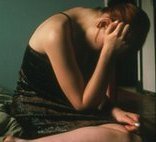Women
Emotional & Behavioral Disorders of Women
Women experience emotional upheavals at different stages of their life due to hormonal flux. This can give rise to Premenstrual syndrome (PMS) or depression, Premenstrual dysphoric disorder (PMDD), perinatal depression in pregnancy or postpartum depression, menopause syndrome etc. in addition to disorders such as anxiety and depression in women.
During, Before or After Menstrual Periods:
Premenstrual syndrome (PMS) has a wide variety of symptoms, including mood swings, tender breasts, food cravings, fatigue, irritability and depression. Symptoms tend to recur in a predictable pattern but may be particularly intense in some months and only slightly noticeable in others.

You do not have to suffer! Treatments and lifestyle adjustments can help reduce or manage the signs and symptoms of premenstrual syndrome and improve quality of life.
Premenstrual dysphoric disorder is a severe disorder that occurs in the last week of the menstrual cycle and usually improve within a few days after menstruation begins. It can impact relationships and daily activities. Symptoms of PMDD include:
- Persistent sadness or depression
- Marked anxiety.
- Mood swings often marked by periods of crying
- Persistent or marked anger or irritability
- Decreased interest in usual activities
- Fatigue or lethargy
- A feeling of being overwhelmed or out of control
- Flu-like symptoms, including muscle aches, headaches and joint pain
- Breast tenderness
- Changes in sleep patterns — problems falling and staying asleep or sleeping too much
- Changes in appetite — overeating, lack of appetite or specific food cravings
Menopause:
Menopause refers to hormonal changes cause the physical and emotional symptoms in elderly women. It is a natural biological process, not a medical illness.
The signs and symptoms of menopause, however, often appear long before the cessation of menstruation, maybe even in the early 40s. They include:
- Irregular periods
- Decreased fertility
- Vaginal dryness
- Hot flushes
- Sleep disturbances
- Mood swings
- Increased abdominal fat
- Thinning hair
- Loss of breast fullness
The physical and emotional symptoms of menopause can disrupt sleep, sap energy and trigger feelings of sadness and loss.
Even though menopause is not an illness, the symptoms are treatable and can vastly improve quality of life. you shouldn’t hesitate to get treatment if you’re having severe symptoms. Many treatments are available, including medication. lifestyle adjustments and hormone therapy.
After Childbirth:
The birth of a baby can trigger a jumble of powerful emotions, from excitement and joy to fear and anxiety. But it can also result in more serious problems such as depression or psychosis.
Many new mothers experience depression (baby blues) after childbirth, however in some it may reach a more severe form of emotional distress known as postpartum depression. Rarely, an extreme form of postpartum depression known as postpartum psychosis develops after childbirth.
Both conditions are treatable and the disorders can be completely reversed with medication.
